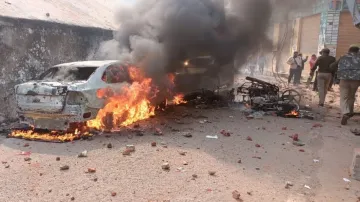Uttar Pradesh: Tension escalates in Sambhal as survey of Shahi Jama Masjid resumes amid protests
Tensions escalated in Sambhal as a survey of the Shahi Jama Masjid resumed, leading to clashes between the police and protesters following claims that the mosque was originally a Hindu temple.

In Sambhal, Uttar Pradesh, tensions flared once again today as a survey of the Shahi Jama Masjid was carried out under heavy security. A team arrived at the mosque early at 6 AM to conduct the survey, which had been ordered by the local district court. The survey team, led by district officials including District Magistrate (DM) Dr. Rajendra Pensia, Superintendent of Police (SP) Krishna Kumar Bishnoi, Sub-Divisional Magistrate (SDM), and Circle Officer (CO), was escorted by large contingents of the Provincial Armed Constabulary (PAC) and Rapid Response Force (RRF) personnel to ensure the safety and smooth progress of the survey.
The Shahi Jama Masjid, located in the heart of Sambhal, has been the center of controversy after a petition filed by Hindu organizations claimed that the mosque was originally a Hindu temple, known as the Harihar Temple, allegedly converted into a mosque by Mughal Emperor Babur in 1529. The court had ordered a survey of the mosque, including video and photographic documentation, to assess the claim.
Violence erupts as protestors clash with police
Despite the heavy security, the situation quickly escalated as a large crowd gathered outside the mosque in protest of the survey. Tensions reached a boiling point when the protesters began throwing stones at the police, who were stationed to maintain order. In response, the police fired tear gas shells and resorted to lathi charge to disperse the crowd. The clash resulted in further unrest, with reports of protests spreading throughout the area. Some vehicles near the mosque were also set on fire during the violence.
As the police attempted to control the situation, drones were deployed to monitor the crowd, and additional police forces were dispatched to maintain law and order. Police forces continued to patrol the streets, and personnel were stationed on rooftops to prevent any further escalation.
Court orders and political reactions
The survey is a result of a legal battle that began on November 19, when Hindu petitioners, led by advocate Vishnu Shankar Jain, approached the Senior Civil Division Court of Chandausi. The petitioners claim that the Shahi Jama Masjid was originally a Hindu temple dedicated to Lord Harihar. They argue that Babur’s forces destroyed the original temple in 1529 and constructed a mosque in its place. The court appointed an Advocate Commission to oversee the survey and ensure that proper documentation, including photographs and video recordings, is carried out.
The Uttar Pradesh government has supported the court’s decision to conduct the survey. Uttar Pradesh Deputy Chief Minister Keshav Prasad Maurya stated that the government and police were simply fulfilling the court’s order. He emphasized that anyone obstructing the survey or engaging in illegal activities would face legal consequences.
Political leaders condemn violence stress rule of law
As the protests turned violent, political leaders reacted strongly. Uttar Pradesh BJP leader and state minister Jayveer Singh condemned the actions of the protesters, stating that certain groups believed themselves to be above the law, defying the Constitution, and undermining judicial orders. He added that the government, under the leadership of Prime Minister Narendra Modi and Chief Minister Yogi Adityanath, would ensure the rule of law was upheld in the state.
BJP spokesperson Rakesh Tripathi also responded to the unrest, calling for strict action against those attempting to take the law into their own hands. "The days of Mughal rule are over. If anyone has an issue with the court’s order, they should challenge it in a higher court, but they cannot take the law into their own hands," Tripathi said.
Survey successfully completed amid continued tensions
Despite the violent clashes, the survey of the Shahi Jama Masjid was successfully completed. Advocate Vishnu Shankar Jain, one of the key petitioners in the case, confirmed that the survey was conducted as per the court’s instructions, and all necessary documentation was completed. The survey findings will be submitted to the court by November 29.
Jain emphasized that the temple site is under the protection of the Archaeological Survey of India (ASI), and any alterations or encroachment on the site are prohibited by law. He also highlighted that the court had issued clear instructions for the survey to be conducted under proper legal procedures, with video and photographic evidence.
Heavy police deployment in area
In the aftermath of the clashes, the police have continued to monitor the situation in Sambhal. A heavy police presence remains in the area, with additional forces deployed to ensure that law and order is maintained. Local authorities have also been conducting surveillance using drones and CCTV cameras to track down individuals involved in the violence, with a promise of strict action against those responsible.
The district administration has urged the public to remain calm and avoid any further violence. As the investigation into the violence continues, authorities are working to identify the individuals involved in the clashes, and legal action is expected to be taken in the coming days.
Looking ahead: November 29 deadline for survey report
As the survey report is expected to be submitted to the court by November 29, the outcome of this case remains highly anticipated. The ongoing unrest in Sambhal underscores the sensitivity of the issue, and the court’s upcoming report may have significant implications for the future of the Shahi Jama Masjid and the surrounding area. The developments in this case are likely to spark further debates, as tensions continue to simmer in the region.
(Inputs from Rajiv Sharma and Anamika Gaur)